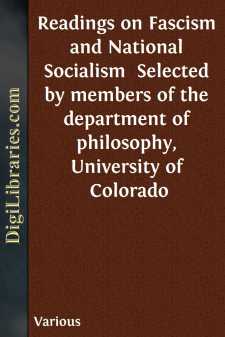Categories
- Antiques & Collectibles 13
- Architecture 36
- Art 48
- Bibles 22
- Biography & Autobiography 813
- Body, Mind & Spirit 142
- Business & Economics 28
- Children's Books 15
- Children's Fiction 12
- Computers 4
- Cooking 94
- Crafts & Hobbies 4
- Drama 346
- Education 46
- Family & Relationships 57
- Fiction 11828
- Games 19
- Gardening 17
- Health & Fitness 34
- History 1377
- House & Home 1
- Humor 147
- Juvenile Fiction 1873
- Juvenile Nonfiction 202
- Language Arts & Disciplines 88
- Law 16
- Literary Collections 686
- Literary Criticism 179
- Mathematics 13
- Medical 41
- Music 40
- Nature 179
- Non-Classifiable 1768
- Performing Arts 7
- Periodicals 1453
- Philosophy 64
- Photography 2
- Poetry 896
- Political Science 203
- Psychology 42
- Reference 154
- Religion 513
- Science 126
- Self-Help 84
- Social Science 81
- Sports & Recreation 34
- Study Aids 3
- Technology & Engineering 59
- Transportation 23
- Travel 463
- True Crime 29
Readings on Fascism and National Socialism Selected by members of the department of philosophy, University of Colorado
by: Various
Categories:
Description:
Excerpt
THE DOCTRINE OF FASCISM
Benito Mussolini
From the Encyclopedia Italiana. Vol. XIV
The English translation of the "Fundamental Ideas" is by Mr. I.S. Munro, reprinted by his kind permission from "Fascism to World-Power" (Alexander Maclehose, London, 1933).
FUNDAMENTAL IDEAS.
1. Philosophic Conception.
Like every concrete political conception, Fascism is thought and action. It is action with an inherent doctrine which, arising out of a given system of historic forces, is inserted in it and works on it from within. It has therefore a form co-related to the contingencies of time and place; but it has at the same time an ideal content which elevates it into a formula of truth in the higher region of the history of thought.
There is no way of exercising a spiritual influence on the things of the world by means of a human will-power commanding the wills of others, without first having a clear conception of the particular and transient reality on which the will-power must act, and without also having a clear conception of the universal and permanent reality in which the particular and transient reality has its life and being. To know men we must have a knowledge of man; and to have a knowledge of man we must know the reality of things and their laws.
There can be no conception of a State which is not fundamentally a conception of Life. It is a philosophy or intuition, a system of ideas which evolves itself into a system of logical contraction, or which concentrates itself in a vision or in a faith, but which is always, at least virtually, an organic conception of the world.
2. Spiritualised Conception.
Fascism would therefore not be understood in many of its manifestations (as, for example, in its organisations of the Party, its system of education, its discipline) were it not considered in the light of its general view of life. A spiritualised view.
To Fascism the world is not this material world which appears on the surface, in which man is an individual separated from all other men, standing by himself and subject to a natural law which instinctively impels him to lead a life of momentary and egoistic pleasure. In Fascism man is an individual who is the nation and the country. He is this by a moral law which embraces and binds together individuals and generations in an established tradition and mission, a moral law which suppresses the instinct to lead a life confined to a brief cycle of pleasure in order, instead, to replace it within the orbit of duty in a superior conception of life, free from the limits of time and space a life in which the individual by self-abnegation and by the sacrifice of his particular interests, even by death, realises the entirely spiritual existence in which his value as a man consists.
3. Positive Conception of Life as a Struggle.
It is therefore a spiritual conception, itself also a result of the general reaction of the Century against the languid and materialistic positivism of the Eighteenth Century. Anti-positivist, but positive: neither sceptical nor agnostic, neither pessimistic nor passively optimistic, as are in general the doctrines (all of them negative) which place the centre of life outside of man, who by his free will can and should create his own world for himself....












